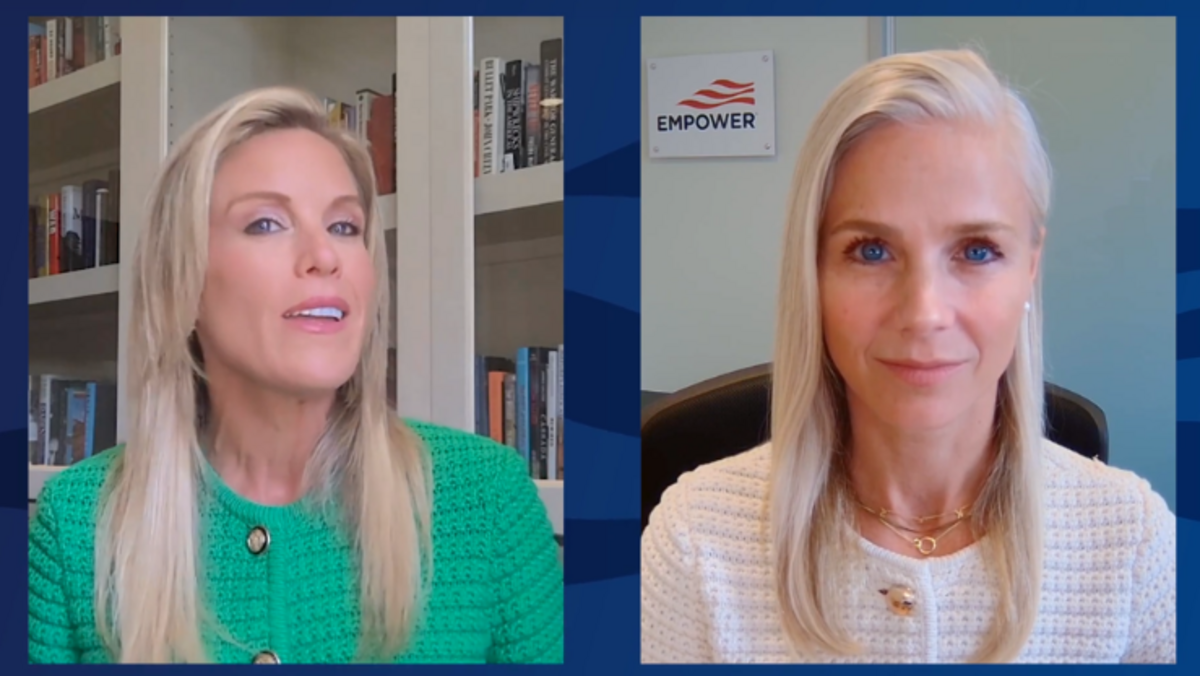Market Moves: Stocks rebound after sell-off
Market Moves: Stocks rebound after sell-off
Market Moves: Stocks rebound after sell-off

In this video, Vanessa Welch, Empower vice president for financial insights, and Marta Norton, Empower chief investment strategist, reflect on the latest market sell-off and rebound, as well as Chairman Jerome Powell's future as Federal Reserve Chairman. Here is a transcript:
Vanessa Welch: Despite today's gains, the Dow Jones Industrial Average remains on track for its worst April since 1932.
Markets rebounded significantly this morning after yesterday's steep sell-off. Marta Norton, Empower's chief investment strategist, is here with me to discuss. Marta, we're seeing investors wade back into the market after yesterday's huge losses. Is this just a temporary bounce or something more substantial, do you think?
Marta Norton: Well, really, the backdrop hasn't changed over the past few weeks. We're still in this environment of heightened macroeconomic uncertainty. Of course, we're entering earnings season. Investors are parsing company earnings to find any impact from tariffs — any guidance on what to expect — and now there's renewed pressure, between the relationship with President Trump and Chairman Powell, and President Trump's dissatisfaction with Powell's decision making.
Welch: The Trump Powell tension certainly drove yesterday's sell-off after he called Powell a major loser on social media, but he's made similar comments before. I'm curious, Marta, why the market reacted so strongly yesterday, and with those tensions still lingering, what's changed in 24 hours that has investors jumping back in?
Norton: Well, if we’re looking at the market sell off yesterday and the bounce back today, I would argue that there hasn't really been anything fundamental that's changed. Really, that's a technical move, meaning, trading activity yesterday and potentially thin volumes on the Monday after Easter. And, of course, bounce backs are common. When we have a massive sell-off, the next day it's not uncommon to see a rally.
Now, of course, this tension is hitting at a time of heightened economic uncertainty with the tariff backdrop and the changing trade policy that we're dealing with. We've also seen Trump willing to touch a third rail in pursuit of his America First agenda. That's certainly what we saw on Liberation Day. So perhaps as we consider Chairman Powell's future as Federal Reserve Chairman, folks are wondering if Trump is once again willing to touch that third rail. So, potentially investors are taking that concern more seriously.
Welch: And Marta, despite today's gains, the Dow Jones Industrial Average remains on track for its worst April since 1932, and U.S. stocks broadly are off to the worst start of a presidential term in a century. Many people are wondering if Trump can actually remove Powell from his position.
Norton: Well, the White House says that it's studying that very question. Now I would suggest that there doesn't seem to be complete agreement or alignment within the Trump administration. So, for example, Treasury Secretary Scott Bessent has suggested that Federal Reserve independence is quite important. It's also worth noting that this has never really been tried.
In the Federal Reserve Act, it says a chair can only be removed for cause. So, ascertaining what that cause is, is pretty important to the ability to move forward here. There are certain cases before the Supreme Court that could potentially open the door to this kind of change, but even then, the structure of the Federal Reserve is very different, and it complicates the decision there. Ultimately, if we were to see this move forward, and I'm not necessarily sure that we will, it would potentially end up before the Supreme Court.
Welch: So, Marta, if the unprecedented happens and Powell was removed, what might happen to markets that are already experiencing all of this volatility?
Norton: Well, at the risk of sounding like a broken record, I still stress that we're still pretty far from this. But if we were to see this occur, I think it would be a massive uncertainty shock. I think we could see pretty meaningful stock markets and across bond markets. And, of course, it's that volatility in the treasury market that is credited for causing President Trump to blink and pull back a bit on his tariffs in the wake of Liberation Day. That is where we'd watch very closely for signs of trouble.
Welch: So, beyond the Fed drama, what else should investors be focusing on?
Norton: Okay. So, again, just reiterating that idea that the climate hasn't really changed. We're in an environment where macro uncertainty is very high, so tariff talk is something that investors are going to continue to watch very closely. We're also on earnings watch, and, of course, economic data looms largely as we try to ascertain what the shifts are that come from this changing tariff policy.
I want to stress that there is good news amidst all this uncertainty. When we entered 2025, valuations for U.S. equities were very, very high — really at historic levels. Today, they're much more approachable, much more in line with averages over time, and that bodes well. Valuations are a critical driver of long-term equity market performance.
Welch: That's a really important reminder, Marta, about those improving valuations.
With several major companies reporting earnings this week, investors will be watching closely for any signs of a tariff impact, though it may be too soon to have real clarity. Thanks as always, Martha, for your insights, and big thanks to you for watching Market Moves. We'll be back next week to analyze the jobs report. Take care.
Get financially happy
Put your money to work for life and play
RO4429986-0425
The content contained in this blog post is intended for general informational purposes only and is not meant to constitute legal, tax, accounting or investment advice. You should consult a qualified legal or tax professional regarding your specific situation. No part of this blog, nor the links contained therein is a solicitation or offer to sell securities. Compensation for freelance contributions not to exceed $1,250. Third-party data is obtained from sources believed to be reliable; however, Empower cannot guarantee the accuracy, timeliness, completeness or fitness of this data for any particular purpose. Third-party links are provided solely as a convenience and do not imply an affiliation, endorsement or approval by Empower of the contents on such third-party websites. This article is based on current events, research, and developments at the time of publication, which may change over time.
Certain sections of this blog may contain forward-looking statements that are based on our reasonable expectations, estimates, projections and assumptions. Past performance is not a guarantee of future return, nor is it indicative of future performance. Investing involves risk. The value of your investment will fluctuate and you may lose money.
Certified Financial Planner Board of Standards Inc. (CFP Board) owns the certification marks CFP®, CERTIFIED FINANCIAL PLANNER™, CFP® (with plaque design), and CFP® (with flame design) in the U.S., which it authorizes use of by individuals who successfully complete CFP Board's initial and ongoing certification requirements.





